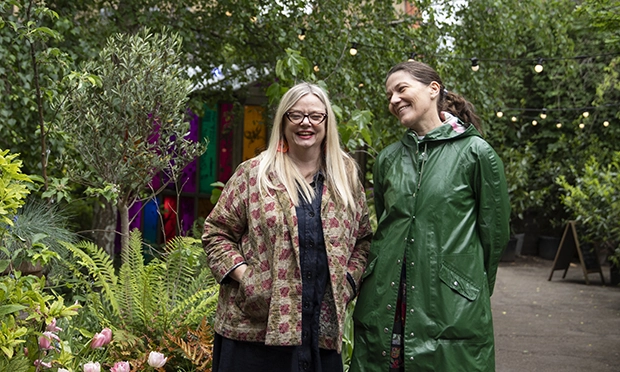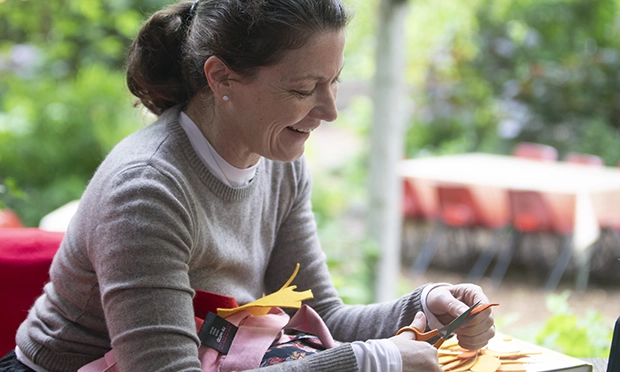‘We are all one’: Dalston Curve Garden features in London-wide exhibition inspired by refugees

Artist Kate Daudy (right) with Curve Garden co-founder Marie Murray. Photograph: UNHCR / Caroline Irby
Among the abundant greenery and colourful petals at the Dalston Curve Garden, a very special flower is ready for visitors to seek out.
This one happens to be made of felt, and is one of several such flowers that have popped up around London as part of a new exhibition.
The Seeds of Hope is the latest collaboration between British conceptual artist Kate Daudy and UNHCR, the UN Refugee Agency.
It has seen Daudy attach her felt creations to the walls of shops, cafes, gardens and monuments across the capital.
Each flower brings with it a message of hope and solidarity through the stories of refugees, with videos that can be viewed by scanning a wooden QR code found nearby.
The idea is to highlight how refugees can thrive with compassion and the right support – just as seeds caught on the wind can eventually flower elsewhere.

Daudy crafts one of the flowers. Photograph: UNHCR / Caroline Irby
Daudy said: “This project – which is, among other things, a love letter to London – is an invitation to consider the fact that we are all one.
“Each of us can take part in building a more harmonious future – if we choose to do so.”
More than a dozen organisations across London have agreed to host a flower, which Daudy carefully crafts to fit the respective space.
The work was inspired by the artist’s observations of flowers and plants grown in refugee camps from seeds that people took with them when fleeing their homes.
Ten refugee storytellers who have found sanctuary across the United Kingdom have shared the meaning that a flower, plant or seed holds for them.
Their accounts represent the variety of refugee experiences, extending across Afghanistan, Iran, Pakistan, Syria and Ukraine.
Usman, who runs Haven Coffee in Walthamstow, hails from Pakistan and tells the story of the beans that now fuel his business. His cafe supports refugees through barista training.
Syrian refugee Wafa, who has resettled on the Isle of Bute, talks about the narcissus flower – known in the UK as the daffodil – and why it reminds her of home.
For Maya, also a refugee from Syria and a UNHCR Goodwill Ambassador, the smell of jasmine that wafts across London in the spring brings her back to Damascus.
Vicky Tennant, UNHCR’s representative to the UK, said: “We’re thrilled to be working with artist Kate Daudy, several iconic London locations, and refugees on this powerful project.
“It shows how people from all walks of life can come together in creative ways to bring hope and support refugees.”
Other locations where Daudy’s flowers can be found include Uniqlo on Oxford Street and St James’ Church in Piccadilly, along with a number of galleries, refugee-owned businesses and other community gardens.
Just as the flowers have appeared organically across the city, the felt will naturally biodegrade until eventually they disappear, just as naturally as they arrived.
For more information, visit UNHCR’s Seeds of Hope website here.
